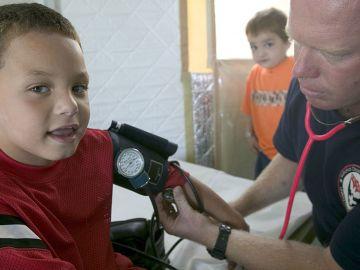
Caption
More than 2,000 people shared their views on public health priorities, progress, and sources of trusted information as part of a recent poll.
|Updated: February 11, 2025 12:49 PM
LISTEN: According to a new poll from Gallup and Emory University, people prioritize health care, safe food and water, and the reduction of chronic diseases like high blood pressure and heart disease. GPB’s Ellen Eldridge has more.

More than 2,000 people shared their views on public health priorities, progress, and sources of trusted information as part of a recent poll.
Access to affordable health care, safe food and water, and reducing chronic disease like high blood pressure and heart disease are the top three public health priorities, according to a new poll from Gallup and Emory University.
Chronic diseases like hypertension, heart disease and obesity are going up nationwide, some more than others, according to the latest Healthy Georgia Report. The state ranks about average, nationally, when it comes to people having multiple chronic diseases at once.
More than 2,000 people aged 18 and older took a web-based survey between Dec. 2 and Dec. 15, 2024, said Dr. Stephen Patrick, a pediatrician at Children's Health Care of Atlanta and the chair of the Department of Health Policy and Management at Emory University's Rollins School Public Health.
The opioid crisis was the top priority for roughly 1 in 5 Americans, Patrick said. Another 20% topped their lists with protecting children from firearm violence, which is the biggest killer among children.
Health care providers, doctors and nurses, and scientific research, are the top three trusted sources for public health information, Patrick said. After that, about 40% of respondents trusted the Center for Disease Control and Prevention (CDC).
"I look towards the Center for Disease Control and Prevention for resources, whether that's a vaccine schedule for newborns or, you know, various screening pieces," Patrick said. "Ultimately, as you know, physicians, we're looking towards trusted sources. And one of our trusted sources is the CDC."
Without trust in health officials, people go without critical health screenings and chronic conditions or other diseases can go unchecked and become fatal, said Biplap Datta, a public health professor at Augusta University.
“We have to regain trust,” he said.
With less people visiting clinics and hospitals in person, providers weren’t able to communicate as effectively with their patients, Datta said, and, moving forward, public health policy should focus on communication.
“The important thing is to communicate transparently and consistently,” Datta said.
"When public health works, you don't hear anything about it."
— Dr. Stephen Patrick
When the survey asked who should be responsible for overseeing their top public health priorities, Americans across political parties wanted the federal government to play the biggest role, Patrick said.
The report published before President Trump's inauguration and nominations such as Robert F. Kennedy Jr. to lead the U.S. Department of Health and Human Services (HHS).
If confirmed, Kennedy would oversee multiple agencies including the CDC, the U.S. Food and Drug Administration (FDA) and Centers for Medicaid and Medicare Services (CMS).
Both U.S. Sens. Jon Ossoff and Rafael Warnock spoke out against the nomination because of the risk associated with an anti-vaccine advocate leading the country's health care policy.
"I will be voting no on Mr. Kennedy's nomination to lead Health and Human Services," Warnock said Jan. 30 during a virtual meeting with the press. "He is manifestly unqualified for the job he seeks. Moreover, he refused to commit to helping prevent spikes in health care premiums and his deeply troubling conspiracy theories about the CDC concern me greatly."
Ossoff warned that the Trump administration’s attacks on the CDC are undermining the vital work of the agency's data, research, and public health reporting.
Without support or funding for health agencies, we see data transmissions stop, Patrick said.
"That will trickle down into what's happening in every community that ultimately keeps us safe," he said.
"When public health works, you don't hear anything about it," he said. "When it doesn't, you start to hear something about it."
The Gallup/Emory poll from December shows the effects that public health has on everyone across not only Georgia but also the country.
"I'm also from a rural community," Patrick said. "When we think about, you know, who is making sure restaurants are safe or who is making sure water is safe, those are local public health officials. Right?"
Pandemic preparedness was not a top concern among the people polled, and that worries Patrick about local disease outbreaks like measles and H5N1 or avian influenza (bird flu).
"I worry we're going to start to hear about local disease outbreaks and other things like that because we're sort of seeing a lapse in services and funding," Patrick said.